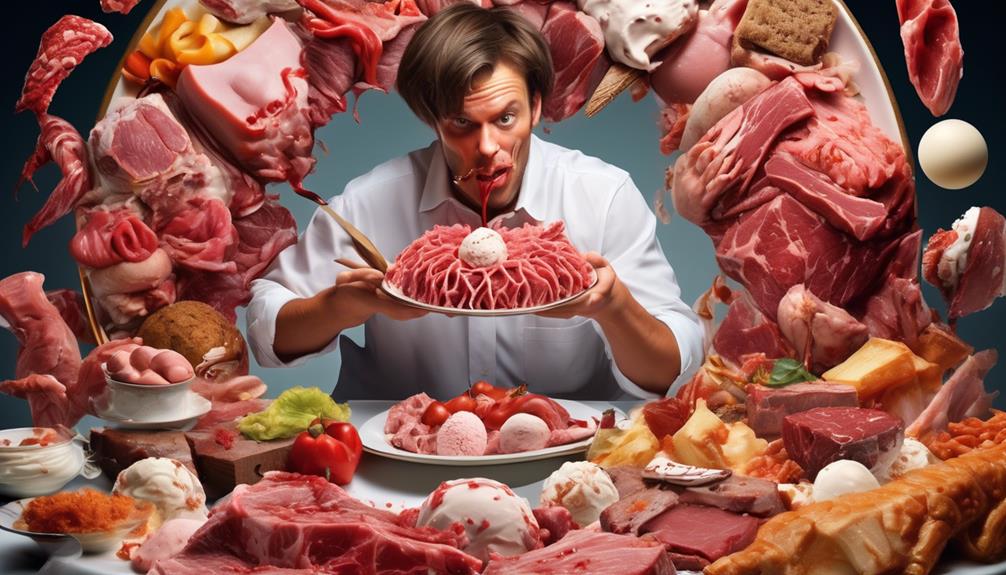Investigating the intricate patterns of narcissists’ eating habits is akin to unraveling a puzzle box, with multiple layers waiting to be unveiled.
The correlation between narcissism and food offers a fascinating insight into the complexities of human behavior. From peculiar preferences to manipulative tendencies, the way narcissists approach their meals can be telling of deeper psychological patterns.
Let's explore how these idiosyncratic eating habits shed light on the intricate world of narcissistic personalities and the impact it has on their relationships and interactions.
Key Takeaways
- Narcissists use food as a tool for manipulation and control in relationships.
- Peculiar eating rituals and restrictive behaviors reinforce their sense of entitlement.
- Narcissists hoard and closely monitor food to establish dominance and power dynamics.
- Their eating habits hinder healthy eating, perpetuate dysfunction, and cause emotional harm.
The Connection Between Narcissism and Food
When examining the intricate relationship between narcissism and food, it becomes evident that peculiar eating behaviors and manipulative tactics often characterize the dietary habits of individuals with narcissistic traits. Narcissists display strange eating habits, from intricate rituals to extreme behaviors like binge eating or strict dieting, all driven by the need for control and attention. Their relationship with food mirrors their mental health, using it as a tool to manipulate others and assert dominance.
Narcissists prioritize their own needs over others, disregarding preferences and using food as a means of control in relationships. They hoard food, track every item, and use it to reward or punish based on compliance. Sharing a meal with a narcissist becomes a one-sided act, focused solely on nourishing their ego. In parenting, narcissists may impose arbitrary rules around food, dismissing a child's desires.
Conversations about food with narcissists often lead to conflict, as they lack support, setting others up for failure and criticizing any deviation from their standards. The connection between narcissism and food highlights the deeper issues of control and manipulation that underpin their behavior.
Key Characteristics of Narcissist Eating Habits

Examining the eating habits of narcissists reveals distinct patterns that reflect their need for control and manipulation through food.
- Sense of Entitlement: Narcissists often display entitlement by insisting on specific brands or types of ingredients, showcasing their need for control over their meals.
- Manipulative Behaviors: They use food as a tool for manipulation in relationships, using it to reward or punish others based on compliance with their demands.
- Attention-Seeking: Narcissists may have a distorted relationship with food, using it to seek validation and admiration from others rather than for nourishment.
- Excessive Control: Engaging in excessive food-related rituals or behaviors, such as meticulous arrangement of food or weighing every meal, to maintain a sense of control and perfectionism.
- Lack of Empathy: They may hoard food, keep track of every item, and exhibit reluctance to share, showcasing a lack of empathy and a desire for control over others.
These key characteristics of narcissist eating habits highlight a complex interplay of control, manipulation, and the pursuit of attention and admiration through food.
13 Peculiar Eating Behaviors of Narcissists
The distinct patterns observed in the key characteristics of narcissist eating habits seamlessly lead us to the exploration of the peculiar eating behaviors exhibited by individuals with narcissistic traits.
Narcissists showcase peculiar eating behaviors that intertwine with their manipulative tendencies. These individuals may exhibit weird eating rituals, such as requiring specific table settings or eating certain foods in a particular order, to assert dominance and control over others. Covert narcissists, in particular, can be extremely picky eaters, limiting themselves to a narrow range of foods that align with their sense of entitlement.
Moreover, narcissists use food as a tool to garner attention and admiration, making meal times about themselves rather than shared experiences. They may hoard food, control portions, and create arbitrary rules to maintain superiority. By manipulating others through food, narcissists impede genuine bonding, prioritizing their selfish desires over nurturing relationships.
Their peculiar eating behaviors extend to withholding food, imposing strict rules, and dismissing the needs of their children, illustrating how their narcissism infiltrates even the most basic acts of care and sustenance.
Understanding the Relationship With Food

Our exploration into the intricate dynamics of narcissists' eating habits reveals a profound connection between their behavior and their relationship with food. When delving into the world of narcissism and food, it becomes evident that narcissists often use food as a means to manipulate and control others, displaying a need for excessive power and validation through their dietary choices. Some of the peculiar ways in which narcissists exhibit their relationship with food include:
- Hoarding food and closely monitoring kitchen contents.
- Reluctance to share food, making others feel guilty for eating or abstaining.
- Using food as a tool for dominance and control, establishing power dynamics.
- Manipulating bonding opportunities through food exchanges.
- Imposing arbitrary rules and restrictions on eating, particularly in parent-child relationships, leading to psychological invalidation.
Understanding the relationship between narcissists and food sheds light on their strange eating habits and the detrimental impact their behaviors can have on their surroundings, especially when dating a narcissist.
Impact of Narcissistic Traits on Eating
Embarking on an exploration of narcissists' eating habits, we uncover the profound impact their narcissistic traits have on their relationship with food.
Narcissistic traits often manifest in peculiar eating behaviors, such as rigid dietary rules, strange rituals, and using food for manipulation. These individuals may exhibit entitlement during mealtime, seeking immediate gratification through excessive indulgence or withholding food to assert control over others.
Family meals can become battlegrounds where narcissists dominate by restricting food, imposing rules, or dismissing others' preferences. Their refusal to share or participate in reciprocal acts undermines bonding and reinforces their need for power and admiration.
Moreover, narcissistic parents may use food as a tool for manipulation and dominance, depriving their children of autonomy and fostering a sense of inadequacy.
Ultimately, the impact of narcissistic traits on eating extends beyond mere nourishment, shaping dysfunctional dynamics within relationships and perpetuating a cycle of control and entitlement.
Frequently Asked Questions
Do Narcissists Have Food Issues?
Yes, narcissists often have food issues. These issues can manifest in various ways, such as unusual eating rituals, hoarding behaviors, extreme dieting, and rigid dietary restrictions.
Their relationship with food is often intertwined with their need for control, superiority, and manipulation. These patterns of behavior can lead to conflicts, lack of support, and even sabotage in conversations about food and dieting.
What Are Strange Habits of Narcissists?
We have observed various strange habits exhibited by narcissists. These behaviors often involve controlling others, seeking attention, and lacking empathy.
Their manipulation tactics extend to many aspects of life, including communication and relationships. Through their actions, narcissists establish dominance and power dynamics, using different tools like food to exercise control.
Understanding these behaviors can provide insight into the complex nature of narcissistic personalities and their impact on those around them.
How Does a Narcissist Act When They Are Dying?
When a narcissist is dying, their behavior often intensifies, seeking more attention and control. They may exhibit heightened entitlement, demanding special treatment. Some become fixated on appearance, maintaining strict diets. Illness can be used to manipulate sympathy. Denial of mortality is common.
Seeking validation, they may manipulate others to meet their needs. Anger or passive withdrawal may be displayed towards loved ones. This vulnerable state exposes their true nature even more.
Are Narcissists Fussy Eaters?
We've found that narcissists can indeed be fussy eaters. Their selective preferences often stem from a desire for control and a need to assert dominance.
This behavior can manifest in limited dietary choices, specific food rituals, and exaggerated reactions to meals. By using food as a tool for manipulation, narcissists may exhibit unusual eating habits that impact their relationships with others in the kitchen.
Conclusion
In conclusion, the peculiar eating habits of narcissists serve as a symbolic reflection of their deep-seated need for control and admiration. By manipulating their food choices and behaviors, narcissists seek to assert dominance and power in their relationships.
Understanding the connection between narcissism and food can provide insight into the complex dynamics at play in these individuals' lives. It's through these seemingly mundane actions that the true nature of narcissistic behavior becomes apparent.










